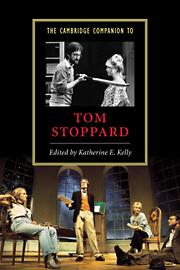Introduction
Published online by Cambridge University Press: 28 May 2006
Summary
This book takes a new look at Tom Stoppard’s drama, fiction, and screen-writing nearly forty years after his work began appearing before audiences. Most contributors agree that the Stoppard style in 2000 is recognizable but fundamentally changed from his self-conscious dandyism of the 1960s and early 1970s. As Stoppard has continued to write, his later work has not only extended his early preoccupation with memory, uncertainty, and ethics but also deepened the sense of human consequence growing from ethical conflict and intellectual doubt. In the past ten years, as many of the book’s chapters suggest, Stoppard has overcome the charge of emotional coldness, especially the claim that he had failed to represent human love. In slowly dropping his emotional guard, he has imbued his writing with a depth of compassion hinted at in the early work through his consistent appeals to humor.
These chapters are written to introduce both first-time and experienced readers of Stoppard’s novel and plays to the critical tradition that has grown up alongside them from the late 1960s to the present. Most offer the added value of viewing the earlier work through the lens of the later, suggesting both a continuous shifting of Stoppard’s technique and dramatic architecture and a continuity of theme over four decades of writing. In showing us, for example, how a 1967 play like Rosencrantz and Guildenstern Are Dead (R&GAD) both prepares for and inhabits the 1998 screenplay Shakespeare in Love, the chapters encourage us to read Stoppard’s writing as a series of transformational exchanges between texts quoted in the plays, between the history and fiction represented by the plays, and between the writing early and later in his career. This exchange, initiated by the author but completed by “knowing” readers and spectators, is the secret to the pleasure of Stoppard’s plays. It is the hope of this collection to intensify that pleasure for all who use it.
- Type
- Chapter
- Information
- The Cambridge Companion to Tom Stoppard , pp. 10 - 22Publisher: Cambridge University PressPrint publication year: 2001



